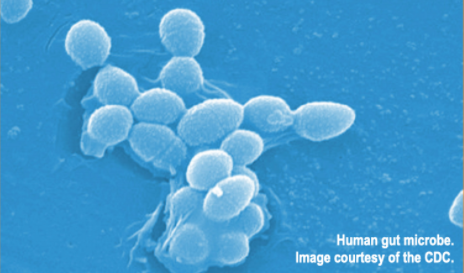When we hear about COVID, most of us think of it as a respiratory illness. However, current research is beginning to link gut health with the severity of COVID symptoms. But you may be asking, How would my gut affect how I experience COVID? Well, when we think about our immune system, we probably imagine a complex system of organs, tissues, and cells. However, between 60% and 70% of our immune system is found in our gut!
A major component of your digestive system are bacteria. You may not know this (or it might seem slightly creepy), but the human body contains more bacterial cells than human cells. You can find bacteria on the skin, in the nose, and most of all, in the gut. Now, when we hear the word bacteria, we typically think, “Ewww. Yuck!”. However, not all bacteria are the same. There is a wide variety of “good bacteria” that are actually quite harmless and help maintain our health. Check out the illustration below. This is an actual image of the human gut microbe. These microbes make up what we call the human microbiome.

Early research is beginning to show a correlation between high quantities of bifidobacterium and a decreased severity of COVID symptoms. This strain of good bacteria is present in large quantities in children and decreases with age. Could this be the reason that kids are more likely to be asymptomatic or even immune to COVID-19?
But you may be saying, “What does having large quantities of the gut bacteria bifidobacterium have to do with making COVID symptoms worse?” COVID-19 is essentially a disease of inflammation, which is a vital part of the immune system's response to injury and infection. Inflammation is the body's way of signaling the immune system to heal and repair damaged tissue, as well as to defend itself against foreign invaders, such as viruses and bacteria. So when you are first infected with COVID-19, it sets off an inflammatory response. You may have heard the term cytokine storm in relation to COVID-19 infection. Cytokines are a group of small proteins (including interleukin, interferon, and growth factors) that control the growth and activity of other immune system cells and blood cells. However, some people’s immune systems send out too many cytokines, causing uncontrollable inflammation throughout the body. In some people, a cytokine storm can lead to multiple organ failure and result in death. But it is here where bifidobacterium comes in. When it is present in large quantities, it benefits our immune function through potent immune-modulating effects—effects that keep the immune system “in check.” Bifidobacteria has actually been shown to have the potential to stop cytokine storms through its impact on cytokines.
Scientists have long understood that there is a link between the makeup of a person's gut flora and acute and chronic illness. In fact, similar to the Human Genome Project, there is a Human Microbiome Project funded by the National Institutes of Health. This project houses a vast array of diseases that have now been linked to the presence, or absence, of certain microbes in our guts. There is even initial research exploring the potential of taking probiotics to enhance vaccine efficacy. To learn more, visit NIH.gov or check out this Vaccine journal article.
